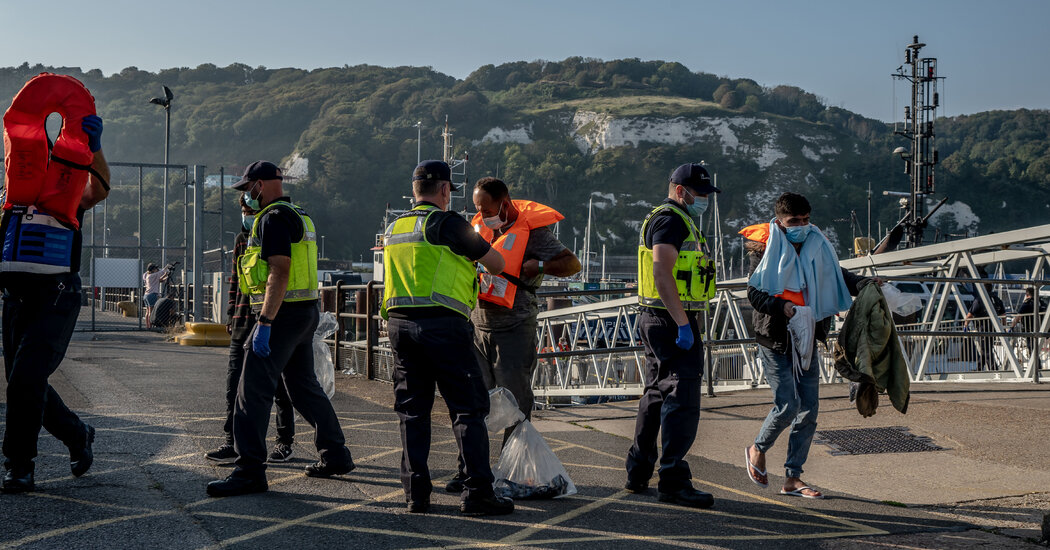
LONDON — Last-minute legal challenges on Tuesday grounded a flight that was scheduled to take asylum seekers from Britain to Rwanda, in an unexpected setback to a new, hard-line migration policy from the British government and an eleventh-hour reprieve for those facing deportation.
The decision to stop the flight came at the end of a day of uncertainty, as the small number of people who had been told they would still be on the plane made last-ditch challenges in several courts to resist removal from Britain.
A ruling by the European Court of Human Rights effectively halted the deportations, dealing a significant blow to a new migration plan outlined by Prime Minister Boris Johnson, whose government has been embarrassed by the arrival of asylum seekers crossing into Britain from France on small boats.
An aircraft, chartered at a cost of £500,000, according to British media reports, had been readied to take off from a military airport late Tuesday. But after a series of legal judgments, it did not leave on the 4,000-mile journey to Rwanda.
Although Britain is no longer a member of the European Union, it is a member of the Council of Europe and a signatory to the European Convention on Human Rights, and therefore accepts judgments from the European Court of Human Rights, which is based in Strasbourg, France.
In a statement, the home secretary, Priti Patel, said it was “very surprising that the European Court of Human Rights has intervened despite repeated earlier success in our domestic courts.”
She added: “We will not be deterred from doing the right thing and delivering our plans to control our nation’s borders. Our legal team are reviewing every decision made on this flight and preparation for the next flight begins now.”
In 2016, Mr. Johnson led the campaign for Britain to leave the European Union, arguing that it would allow the country to “take back control” of its borders, and the arrival of asylum seekers from France has presented a political problem for his government.
Relations with the French government have been tense after Brexit. And, with limited cooperation with the French authorities, Mr. Johnson’s government has searched for other ways to curb the arrivals that have become an embarrassing symbol of Britain’s failure to police its post-Brexit frontiers.
The British government announced in April that it had reached a deal with Rwanda that would allow the processing and settling of asylum seekers in the African country. In return, Britain would pay Rwanda 120 million pounds for economic development programs.
The deal has provoked fierce opposition in Britain for being unworkable and unethical, including from religious figures, civil servants and — according to the Times of London — from Prince Charles, the heir to the British throne.
After Tuesday’s flight was grounded, Yolande Makolo, a spokeswoman for the Rwandan government, said it would not be deterred by the latest developments.
“Rwanda remains fully committed to making this partnership work,” she said. “The current situation of people making dangerous journeys cannot continue as it is causing untold suffering to so many. Rwanda stands ready to receive the migrants when they do arrive and offer them safety and opportunity in our country.”
Critics accuse Mr. Johnson, who narrowly survived a vote of no confidence last week, of deliberately stoking the issue for political advantage. They argue that even if very few asylum seekers are deported, the policy is intended to send a signal to voters that Britain is tough on those seeking to enter Britain by crossing the English Channel, many of them in small boats.
Yvette Cooper, who speaks for the opposition Labour Party on home affairs, said the government was “pursuing a policy they know isn’t workable,” but had paid Rwanda 120 million pounds and hired a jet that had not taken off because it wants to stoke a dispute and have “someone else to blame.”
Earlier on Tuesday, Liz Truss, Britain’s foreign secretary, told the LBC radio station that the flights should be seen in the larger context of illegal migration and of criminal gangs making money from bringing migrants into Britain.
The government, Ms. Truss said, needed to ensure “that if they are not on today’s flight, they are on subsequent flights. But fundamentally, we need to break the business model, and that is why we have to take this action.”
The debate over the Rwanda asylum plan comes at a time when immigration into Britain from non-European Union countries continues to rise.
Critics of the government say that British policy effectively criminalizes those who are trying to claim asylum, making it impossible for most genuine refugees to enter the country legally.
Last year, at least 27 people drowned while trying to make the dangerous journey across the English Channel, one of the world’s busiest shipping routes — and even that tragedy failed to deter more from trying to enter Britain on small boats.
In Rwanda, the deportation deal adds to efforts by President Paul Kagame to promote his country as a darling of donors, open to business and a partner in finding solutions to global migration. Mr. Kagame, 64, who came to power after the 1994 genocide, has fashioned himself as a visionary bent on tackling poverty, reducing corruption and raising the profile of women.
He has also sent Rwandan troops to keep peace in troubled neighboring states and taken in African refugees who had faced brutal conditions in detention centers in Libya.
Yet Mr. Kagame’s rule has been overshadowed by his government’s record on human rights, which drew concern even from the British government last year.
Civil society groups have accused Mr. Kagame of cracking down on opposition figures, muzzling the news media and carrying out enforced disappearances and torture. Rwanda — alongside China, Turkey and Iran — has also been listed as one of the top countries that carry out “aggressive campaigns of transnational repression” by Freedom House, a U.S.-based nonprofit group.
This included the sentencing of Paul Rusesabagina, the dissident whose actions during the genocide were portrayed in the Oscar-nominated movie “Hotel Rwanda.” In a letter reviewed by The New York Times, the State Department last month declared Mr. Rusesabagina, a permanent resident of the United States, as “wrongfully detained” by Rwanda.
Given this, the deportation deal with Mr. Johnson’s government risks legitimizing Mr. Kagame’s authoritarian streak, said Evan Easton-Calabria, a senior researcher at the Feinstein International Center at Tufts University.
The safety of the asylum seekers in Rwanda was also a concern, she said, adding that refugees had faced arrests, threats and killings there in the past. Nor is there any guarantee that those taken to Kigali, the capital, will stay there rather than trying to re-enter Europe via new routes. In the past, some of those moved to Rwanda under an Israeli plan left the country.
“There’s a real risk in letting these flights go ahead,” said Dr. Easton-Calabria, who has worked with refugees in Uganda. “The risk is that a lot of people will remain completely unassisted, completely traumatized in a country where they don’t have any connections and don’t know the language.”
The plan for migrant deportations also come as Rwanda is engaged in a diplomatic standoff with the Democratic Republic of Congo, which accused Kigali of supporting the M23 rebel group that it is battling.
Stephen Castle and Cora Engelbrecht reported from London, and Abdi Latif Dahir from Nairobi, Kenya.




